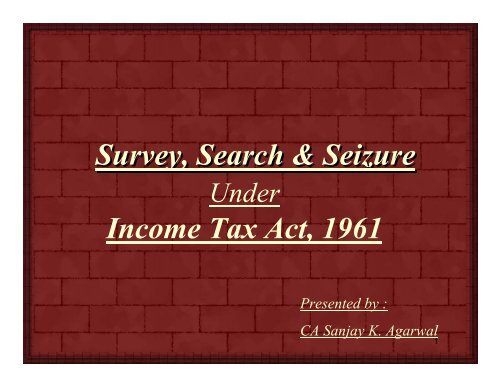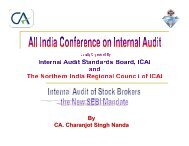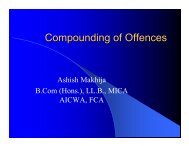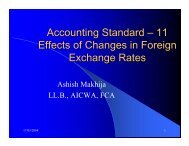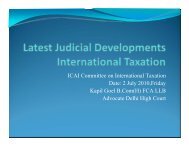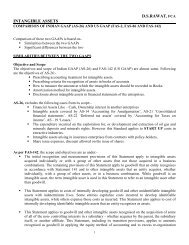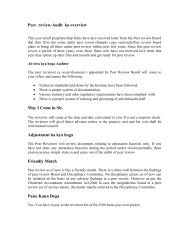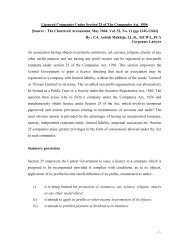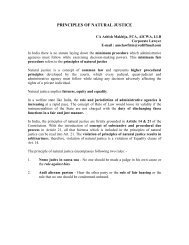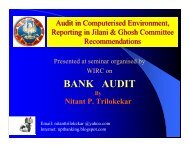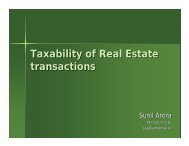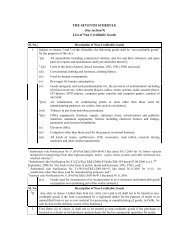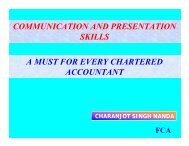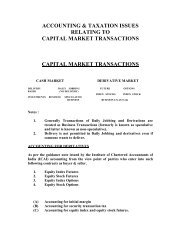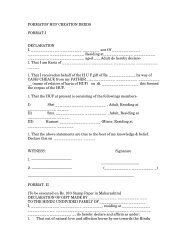Survey, Search & Seizure Income Tax Act, 1961
Survey, Search & Seizure Income Tax Act, 1961
Survey, Search & Seizure Income Tax Act, 1961
Create successful ePaper yourself
Turn your PDF publications into a flip-book with our unique Google optimized e-Paper software.
<strong>Survey</strong>, <strong>Search</strong> & <strong>Seizure</strong><br />
Under<br />
<strong>Income</strong> <strong>Tax</strong> <strong>Act</strong>, <strong>1961</strong><br />
Presented by :<br />
CA Sanjay K. Agarwal<br />
1
Topics for Discussion<br />
Pre <strong>Survey</strong> & <strong>Search</strong><br />
precautions.<br />
Sailent features of survey<br />
proceedings.<br />
<br />
Salient features of <strong>Search</strong> &<br />
<strong>Seizure</strong> proceedings<br />
2
Pre <strong>Survey</strong> & <strong>Search</strong> precautions<br />
3
Pre <strong>Survey</strong> & <strong>Search</strong> Precautions<br />
Avoid<br />
To keep Books of accounts at any place other than<br />
Registered Office.<br />
To share common premises, however if assesses share<br />
common premises then the MAP should be affixed at<br />
some common visible place identifying the assignment of<br />
particular area to particular assessee, since it could lead<br />
to Multiple Operations.<br />
To Keep Personal documents of workers and employees<br />
in business premises.<br />
To do Backdating and editing in books of Accounts. In<br />
case practices like backdating or editing are followed then<br />
confirm from computer software vendor that such<br />
practices are not detectible.<br />
4
Ensure<br />
Pre <strong>Survey</strong> & <strong>Search</strong> Precautions<br />
Computer hard disk does not contain any irrelevant data.<br />
That Books of accounts are properly updated.<br />
That person in-charge of business have proper acquaintance of<br />
business affairs.<br />
That stock register are maintained and kept updated.<br />
That if no stock registers are maintained then inventory<br />
verification list is prepared at regular dates<br />
That physical cash available and cash in books of account<br />
matches.<br />
5
Pre <strong>Survey</strong> & <strong>Search</strong> Precautions<br />
Ensure<br />
Assessment particulars of Directors in case of company,<br />
partners in case of firms ,members in case of AOP and<br />
trustees in case of trust should be readily available.<br />
Registered value of property in name of every relevant<br />
person should be known.<br />
Where records are maintained at various levels for cross<br />
verification, they should be in reconciliation up to date for<br />
e.g. records maintained at Gate, Security Guard, Stores<br />
Keeper etc.<br />
6
Salient features<br />
of<br />
<strong>Survey</strong> Proceedings<br />
7
Topics for discussions<br />
<br />
<br />
<br />
<br />
<br />
<br />
<br />
<br />
<br />
<br />
<br />
Authorized Officers/ Authorizations<br />
Jurisdiction of the <strong>Survey</strong> Authority<br />
Restriction of entry into the place of business or<br />
profession/other places<br />
Powers of <strong>Survey</strong> Team vis a vis Obligations of tax payer<br />
during survey<br />
Other Powers of survey team<br />
Impounding and retention of Books of Accounts<br />
Recording of Statements – some checks<br />
Other Miscellaneous provisions<br />
Invocation of S.131(1)<br />
Presumption.<br />
Conversion of survey in to search.<br />
8
WHO CAN CONDUCT SURVEY –<br />
Authorised/ Authorising Officer (Expln.to<br />
sec.133A)<br />
I. Authorized / Authorizing<br />
‣ Director /Commissioner<br />
‣ Additional Director / Additional Commissioner.<br />
‣ Joint Director/ Joint commissioner<br />
‣ Deputy Director / Deputy Commissioner.<br />
‣ Assistant Director / Assistant Commissioner.<br />
‣ Assessing officer<br />
‣ <strong>Tax</strong> Recovery Officer<br />
‣ Inspector of <strong>Income</strong> <strong>Tax</strong> (For certain Specific<br />
cases only)<br />
9
Authorizations in some cases<br />
Proviso to S.133A(6) …..<br />
<br />
No survey can be conducted, Without Prior approval of<br />
the Joint or Additional Commissioner or Joint or<br />
Additional Director, by<br />
– Deputy Director / Commissioner of <strong>Income</strong> <strong>Tax</strong><br />
– Assistant Director / Commissioner of <strong>Income</strong> <strong>Tax</strong><br />
– Assessing Officer<br />
– <strong>Tax</strong> Recovery Officer<br />
– Inspector of <strong>Income</strong> <strong>Tax</strong>, to a limited extent<br />
Note : No prior notice is required to be effected for survey.<br />
N.K. Mohanty vs. DCIT [1995] 215 ITR 275 (Mad.)<br />
10
Jurisdiction for conducting <strong>Survey</strong> S. 133A (1)<br />
An <strong>Income</strong> <strong>Tax</strong> Authority may enter :<br />
Any place falling in his jurisdictional area.<br />
Any place occupied by any assessee falling in his<br />
jurisdiction.<br />
Any place in respect of which he is authorized for the<br />
purpose of this section by such income tax authority,<br />
who is assigned the area within which such place is<br />
situated or who exercises jurisdiction in respect of<br />
any person occupying such place.<br />
Where the business or profession is carried on by the<br />
assessee not necessarily to be the principal place only, for<br />
this purpose the ‘ place ’ shall also include any other place<br />
where the books of accounts or other documents or any part<br />
of the cash or stock or other valuable article is kept.<br />
11
Contd…<br />
<br />
<br />
<br />
<strong>Survey</strong> is possible even to enquire about tax deducted at<br />
source : Reckitt and Colman of India Ltd. vs. ACIT [2001]<br />
251 ITR 306 (Cal).<br />
Residential premises can also be covered if some<br />
business/professional work/document is being done / kept<br />
there.<br />
Business or residential premises of third parties, including a<br />
Chartered Accountant, a pleader, or <strong>Income</strong> <strong>Tax</strong><br />
Practitioner, of whom the assessee may be a client, are not<br />
places which could be entered into for the purpose of<br />
section 133A. (Circular no. 7- D dt 3/5/1967)<br />
Note : <strong>Survey</strong> team has no power to break open any locked<br />
premises as power to break open any lock is not conferred<br />
u/s 133A as against specific provisions contained u/s 132.<br />
12
Restriction of entry S. 133A(2)..<br />
The <strong>Income</strong> tax authority for conducting the survey,<br />
may enter at any place of business or profession only<br />
during the business hours of such place, however<br />
survey may continue after office hours : Mohnot (N.K.)<br />
vs. DCIT, [1995] 215 ITR 0275 (Mad)<br />
In respect of<br />
other place, wherein the books of<br />
accounts, other documents, cash etc. has been stated<br />
to be kept the survey party can enter only after sunrise<br />
and before sunset.<br />
The restriction is only in respect of entry in to the place of<br />
business or profession and not related to the exit.<br />
13
Power of <strong>Survey</strong> team, vis a vis,<br />
Obligation of tax payer, S.133A(1)<br />
i. Power to inspect books of accounts or other<br />
documents available at such place. ( Power is<br />
also available with Inspector of <strong>Income</strong> <strong>Tax</strong> )<br />
ii. Check or verify the cash, stock or other valuable or<br />
thing found therein<br />
iii. May require to furnish any information as may be<br />
useful for any proceedings under the <strong>Act</strong><br />
14
Other Powers of <strong>Survey</strong> Team S.133A(3)<br />
i. Place marks of identification on books of accounts &<br />
can make extracts & copies there from. ( This power is<br />
also available with Inspector of <strong>Income</strong> <strong>Tax</strong> also)<br />
ii. Make inventory of cash, stock, valuables, article or<br />
thing.<br />
(Section 133A(4) specially prohibits the removal of cash, stock<br />
other valuable article or thing w.e.f. 01/06/2002 ).<br />
iii.<br />
Record statement – Not on oath U/s 133A [ Paul<br />
Mathews & Sons vs. CIT, [2003] 263 ITR 101(Ker)], however<br />
statement can be recorded on Oath, only under<br />
circumstances where S. 133A(6) is invoked : United<br />
Chemical Agency vs. R.K. Singh, ITO [1974] 097 ITR 0014 (All)<br />
15
Impounding and retention of<br />
Books of Accounts U/s 133A(3)(ia)<br />
i. Impound and retain books of accounts only after<br />
recording reasons w.e.f. 01/06/2002: Mrs. Rumena<br />
Rahman vs. Union of India [2004] 265 ITR 0016- (Gau.)<br />
ii.<br />
Permission from CCIT or DGIT is required in case Period<br />
of retention of books or documents exceeds 10 days,<br />
exclusive of holidays (w.e.f. 01-06-2003), where<br />
permission for retention should be granted judiciously,<br />
there should be justification as to non cooperation by the<br />
assessee: Raj and Raj Investments vs. <strong>Income</strong>-tax<br />
Officer [2007] 293 ITR 0057- (Kar)<br />
Note: The Law is silent as to allowing any opportunity to the<br />
assessee to object the impounding of books of accounts.<br />
16
Recording of Statements – Some checks<br />
U/s 133A(3)(iii)<br />
<br />
<br />
<br />
<br />
As per latest circular of CBDT No. 286/2/03- IT (Inv) dt.<br />
10/3/03- no Confessional statement to be elicited.<br />
No provision under the Law to seek copy of statement<br />
from revenue at the time of recording the same, however<br />
in case of statement being used against assessee, he<br />
may ask for its copy by relying on principles of natural<br />
justice and equity.<br />
Other Provisions of CPC applicable, in case, the officers<br />
invoke section 131.<br />
Statement recorded during survey do not have any<br />
evidentiary value.<br />
Case : Commissioner of <strong>Income</strong>-tax Vs. S. Khader Khan Son [2008] 300<br />
ITR 157 (Mad.)<br />
17
Precaution while making<br />
any statement.<br />
<br />
<br />
<br />
<br />
Is there any evidence found during survey that could<br />
lead to an inference of concealment <br />
Is their lies any discrepancy between the stock in<br />
hand and the stock as per books <br />
Is it advisable to admit discrepancies in the stock<br />
Are the provisions of sales tax and excise duty along<br />
with provisions like dis-allowance u/s. 40-A(3), 269-<br />
SS, 269-T etc have been kept in mind before making<br />
any confession statement <br />
18
Precaution while making<br />
any statement.<br />
<br />
<br />
Is it safer to disclose income under the head<br />
"other sources" or "business“ <br />
Would it be desirable to declare the entire amount<br />
as current year’s income or spread over income<br />
for many years as any spread over may result in<br />
liability to interest and penalty for concealment <br />
Is it possible to capitalise the disclosed amount <br />
19
Precaution while making<br />
any statement.<br />
Care should be taken to ensure that the<br />
disclosure takes care to covers the<br />
discrepancies found during the survey and also<br />
those that may be unearthed at a later stage.<br />
Before making retraction the assessee must<br />
prove beyond doubt the circumstances for such<br />
retraction are bonafide & are not after thoughts.<br />
Case: DCIT vs. Bhogilal Mulchand (2005) 3 SOT 211<br />
(Ahd.)<br />
20
Removal is prohibited, S.133A(4).<br />
An income tax authority acting under<br />
this section shall, on no account,<br />
remove or caused to be removed<br />
from the place wherein he has entered,<br />
any cash, stock or any other valuable<br />
article or thing.<br />
21
Lavish and ostensible spending -Sec. 133A(5)<br />
If the income tax authority is of view, of any lavish<br />
expending on any function or ceremony.<br />
It can call for the information from the assessee or<br />
from any other person who is likely to be in<br />
possession of the information with respect to the<br />
expenditure incurred.<br />
However, cannot call for such information before or at<br />
the time of such function, ceremony or event and as<br />
such the power prescribed under this sub-section can<br />
be exercised only when the said function, ceremony<br />
or event is over.<br />
Note: All the powers given in this section are available 22with<br />
Inspector also.
In case of non-cooperation, S. 131(1) can<br />
be invoked Sec. 133A(6)<br />
<br />
<br />
Where during the course of survey assessee<br />
does not.<br />
– Affords the facility to inspect books of<br />
accounts<br />
– Afford facility to check or verify cash, stock etc.<br />
– Furnish any information or to have his<br />
statement recorded.<br />
The <strong>Income</strong> tax authority shall have all<br />
powers u/s 131(1) to enforce compliance.<br />
23
Contd…<br />
<br />
For the purpose of this sub-section, the <strong>Income</strong><br />
<strong>Tax</strong> Authority has been empowered to record the<br />
statement of the assessee or such other person. It<br />
is to be specifically noted that the statement thus<br />
recorded may be used as evidence in any<br />
proceedings under the <strong>Act</strong>.<br />
Note: The legislative intention behind the introduction of the<br />
above provisions on the statute was to curb the use of<br />
blatant tax<br />
evaded money in ostentatious wedding<br />
ceremonies and other social functions (press<br />
released dated 03/06/89)<br />
24
Presumption as to ownership. S. 292 C<br />
Section 292C of the <strong>Income</strong> <strong>Tax</strong> <strong>Act</strong>, <strong>1961</strong> states the<br />
presumption regarding the assets, documents and books<br />
found from the premises of the assessee that: [ Inserted<br />
by Finance <strong>Act</strong>, 2008, w.r.e.f. 1/06/2002].<br />
Such book of account, other documents, money, bullion, jewellery,<br />
other valuable article or thing belong or belongs to such person.<br />
The contents of such books of account and other documents are<br />
true.<br />
The signature and every other part of such books of account and<br />
other documents which purport to be in the handwriting of any<br />
particular person or which may reasonably be assumed to have<br />
been signed by, or to be in the handwriting of, any particular<br />
person, are in that person’s handwriting, and in the case of a<br />
document stamped, executed or attested, that it was duly stamped<br />
and executed or attested by the person by whom it purports to have<br />
been so executed or attested.<br />
25
Whether a survey can be converted into<br />
search<br />
i. i. Law prescribes no bar on initiating search proceedings during the<br />
course of survey but will depend upon the facts and circumstances<br />
prevailing at the time of survey<br />
ii.<br />
The survey ordered at the premises of the petitioners u/s 133A of the<br />
<strong>Act</strong> and conversion of the said operation on the basis of the authority<br />
given by the Additional Director are legal : Vinod Goel & Others vs<br />
Union of India and others 252 ITR 029 (P&H)<br />
i. <strong>Survey</strong> authorisation in the name of doctor, then search<br />
operation at the residence of doctor and hospital premises<br />
belonging to trust is not valid, where no reasons for<br />
conversion of survey operation into search operation were<br />
given. Dr. Nalini Mahajan v. Director of <strong>Income</strong> <strong>Tax</strong><br />
(Inv.) [2002] 257 ITR 123 (Del.)<br />
26
Salient features<br />
of<br />
<strong>Search</strong> and <strong>Seizure</strong><br />
proceedings<br />
27
SEARCH - WHEN POSSIBLE<br />
Situation u/s 132(1)<br />
a) Non-compliance to summon u/s 131(1) or notice u/s 142(1) as to production of<br />
certain Books of Accounts or other documents.<br />
[Even a slightest non compliance may lead to formation of belief]<br />
b) Notice has been / would be issued, but such person has not or might not produce<br />
Books of accounts in respect of any proceeding under IT <strong>Act</strong>.<br />
[Proceeding may be assessment, appellate, revision, penalty, rectification, etc.]<br />
c) Possession of undisclosed money, bullion, jewellery or other valuable article or<br />
thing whether wholly or partly.<br />
(<strong>Search</strong> Warrant in such case can be issued in Form No.45)<br />
Note : For valid search, any of the situation as enumerated above should persist<br />
other wise the entire action could vitate.<br />
Case : CIT vs. Smt. Chitra Devi Soni [2008] 170 <strong>Tax</strong>mann 164 (Raj.) also see L.R.<br />
28<br />
Gupta vs. Union of India [1992] 194 ITR 32 (Del), SLP Pending.
SOME STEPS BEFORE SEARCH<br />
Now there are certain aspects:-<br />
(1) Who can authorize/ who can be authorized<br />
(2) In consequence of information<br />
(3) Mandatory Requirement<br />
(a) Reason to believe<br />
(b) Satisfaction to be recorded<br />
(4) Planning for the Execution<br />
29
AUTHORIZING OFFICER [U/s 132(1)]<br />
(1) Director General of <strong>Income</strong> <strong>Tax</strong><br />
(2) Director of <strong>Income</strong> <strong>Tax</strong><br />
(3) Chief Commissioner of <strong>Income</strong> <strong>Tax</strong><br />
(4) Commissioner of <strong>Income</strong> <strong>Tax</strong><br />
(5) Joint Director / Joint Commissioner of<br />
<strong>Income</strong> <strong>Tax</strong><br />
Note : Jt. Director of Investigation does not have any statutory power to issue authorization u/s<br />
132(1) and therefore the search and seizure operation carried out on the basis of authorization<br />
issued by him was invalid and no block assessment could be framed on the basis of said search.<br />
Case : Capital Power systems Ltd. vs. ACIT [2008] 115 TTJ (Del) 531., however Jt Director of<br />
Investigation is empowered to authorize consequential search. Case : Mrs. Aanisa Batool Gilani v<br />
ACIT [ 2008 ] 21 SOT 323 (Delhi - ITAT)<br />
30
AUTHORISED OFFICERS<br />
<br />
<br />
<br />
<br />
<br />
<br />
<br />
Joint Commissioner of <strong>Income</strong> <strong>Tax</strong><br />
Joint Director of <strong>Income</strong> <strong>Tax</strong><br />
Deputy Director of <strong>Income</strong> <strong>Tax</strong><br />
Deputy Commissioner of <strong>Income</strong> <strong>Tax</strong><br />
Assistant Director of <strong>Income</strong> <strong>Tax</strong><br />
Assistant Commissioner of <strong>Income</strong> <strong>Tax</strong><br />
<strong>Income</strong> <strong>Tax</strong> Officer<br />
31
EXECUTIONS OF AUTHORISATIONS<br />
S.NO. PARTICULARS FORM NO.<br />
1. Authorizations under S. 132(1) other<br />
than proviso thereto by DGIT, DIT,<br />
CCIT, CIT, DDIT, DCIT.<br />
45<br />
2. Authorization under proviso to Section<br />
– 132(1) by CCIT or CIT. (will discuss<br />
later)<br />
3. Authorization under sub – section (1A)<br />
of S. 132 by CCIT or CIT. (will discuss<br />
later)<br />
45 A<br />
45 B<br />
Note: Every authorization shall be in writing under the signature of the<br />
officer issuing the authorization and shall bear his seal.<br />
32
1st Proviso to sub-section (1) of<br />
Section 132<br />
This proviso empowers any Chief CIT or CIT who<br />
has jurisdiction over the area in which the search<br />
premises are situated but having no jurisdiction<br />
over the person to be searched for authorizing the<br />
search where he has reason to believe that any<br />
delay in getting the authorization from the Chief CIT<br />
or CIT having jurisdiction over such person may be<br />
prejudicial to the interests of the Revenue (Warrant<br />
of Authorization in such case can be issued in Form<br />
No.45A).<br />
33
Sub-section (1A) of section 132<br />
This sub-section empowers the Chief CIT or CIT<br />
to authorize an Authorized Officer to exercise the<br />
powers as contained in clauses (i) to (v) also in<br />
respect of any such premises which are not<br />
covered by the Authorization given under subsection<br />
(1) of section 132 (Such warrant of<br />
authorization can be given in Form No.45B).<br />
34
Judicial Pronouncements<br />
There should be nexus between information and person<br />
searched.<br />
[Case: Harilal Shah V. CIT (2006) 281 ITR 199 (Gau.)]<br />
Where the Jurisdiction for block assessment is questioned on<br />
grounds of validity of a search, The <strong>Income</strong> <strong>Tax</strong> Appellate Tribunal<br />
is not competent to go into the question of validity of search.<br />
[Case: Promain Ltd. V. DCIT (2006) 281 ITR (AT) 107<br />
(Del.) SB]<br />
Assessee being co-owners of a building JRT given on lease to JST<br />
and warrant being issue in the name of “ Partners of JRT/JST”,<br />
there was no search on assesses and therefore, notices served on<br />
them under S. 158BC could not be substantiated.<br />
[Case : Jayantilal Damjibhai Soni & Directors of (Invs.) &<br />
Anr. [2008] 219 CTR (Guj) 26. ]<br />
35
Judicial Pronouncements<br />
Warrant in the name of more than one person is valid.<br />
Case :Anjuga Chit Funds P. Ltd. Vs. DCIT [ 2008] 304 ITR (A.T.)0374 (ITAT –<br />
Chen.)<br />
The search proceedings while appeals from assessments were pending<br />
were legal.<br />
Case : Smt. Nandita Acharjee Vs. Union of India [2008] 302 ITR 0075 (Gau.)<br />
<strong>Search</strong> should be a continuous process, unless there is a valid explanation<br />
for the time gap.<br />
Case : Commissioner of <strong>Income</strong>-tax Vs. Sarb Consulate Marine Products P.<br />
Ltd. [ 2007] 294 ITR 0444 (Del.)<br />
Provisions relating to search and seizure do not violate the fundamental<br />
rights under Article 19 & Article 14 of Constitution of India.<br />
Case : Pooranmal vs Director of Inspection (Investigation.) (1974) 93 ITR 505<br />
(SC)<br />
36
Judicial Pronouncements<br />
Mere information from CBI that cash was found from in possession of<br />
an individual cannot justify a search.<br />
Case : Union of India v. Ajit Jain (2003) 260 ITR 80 (SC)<br />
Allegation that <strong>Income</strong> <strong>Tax</strong> Authorities had taken a bribe would not<br />
invalidate the search.<br />
Case : Kamal Khosla vs. Director of <strong>Income</strong> <strong>Tax</strong>: SLP (c.) Nos. 12242-<br />
43: [2003] 264 ITR 140 (St.) SLP rejected, (2003) 264 ITR 140 (St.)<br />
If there is no search warrant in the name of the firm, no search can be<br />
conducted on the firm on the basis of search warrant in the name of<br />
partner.<br />
Case : K.R. Modi & Co. Vs. DDIT (Inv.) (2005) 272 ITR 587 (Cal.)<br />
Close relationship is a valid ground for authorization.<br />
Case : Lajpat Rai vs. CIT [1995] 215 ITR 608 (All.)<br />
37
Rights and Duties<br />
<br />
<br />
<br />
<strong>Income</strong> <strong>Tax</strong> Department.<br />
Assesses<br />
Chartered Accountants<br />
38
<strong>Income</strong> <strong>Tax</strong> Department - Rights<br />
Enter and search any building, place, vehicle, or aircraft<br />
where he has reason to suspect that such books of account,<br />
other documents, money, bullion, jewellery and other valuable<br />
articles are kept. [S.132(1)(i).]<br />
Break open the lock of any door, locker, safe, Almirah or other<br />
receptacle for exercising the powers conferred under (a) supra<br />
where the keys thereof are not available. [ Section 132(1)(ii)]<br />
<strong>Search</strong> any person who has gone out of, or is about to get<br />
into, or is in, the building, place, vessel, vehicle or aircraft, if the<br />
authorized officer has reason to suspect that such person has<br />
secreted about his person any such books of account, other<br />
documents, money, bullion, jewellery or other valuable article<br />
or thing. [Section 132(1)(iia)]<br />
39
<strong>Income</strong> <strong>Tax</strong> Department - Rights<br />
Require any person<br />
who is found to be in<br />
possession or control of any books of account or<br />
other documents maintained in the form of<br />
electronic record as defined in section 2(1)(t) of the<br />
Information Technology <strong>Act</strong>, 2000 to afford the<br />
authorized officer the necessary facility to<br />
inspect such books of account or other<br />
documents. [Section 132(1)(iib)]<br />
Note: Person defaulting u/s 132(1)(iib) shall be liable to rigorous<br />
imprisonment for a term which may extend to two years and shall also<br />
be liable to fine. [S. 275B].<br />
40
<strong>Income</strong> <strong>Tax</strong> Department - Rights<br />
Seize any such books of account, other documents, money,<br />
bullion, jewellery, or other valuable article or thing found as a<br />
result of such search (however, from June 1, 2003, any bullion,<br />
Jewellery or other valuable article or thing being stock - in –<br />
trade of the business found as a result of search shall not be<br />
seized but the authorized officer shall make a note or inventory<br />
of such stock in trade of the business. [Section 132(1)(iii)]<br />
Place marks of identification on any books or other documents<br />
or make or cause to be made extracts or copies there from. [<br />
Section 132 (1)(iv) ].<br />
Make a note or an inventory of such money, bullion, jewellery<br />
or other valuable article of thing. [ Section 132 (1)(v) ].<br />
41
<strong>Income</strong> <strong>Tax</strong> Department - Rights<br />
DEEMED SIEZURE second proviso to clause (1) of section 132.<br />
Where it it is not possible or practicable to take physical possession of any<br />
valuable article or thing<br />
due to its volume, weight or other physical<br />
characteristics or due to its being of dangerous nature, the authorized<br />
officer may serve an order on the owner ( or the person who is in<br />
immediate possession thereof ) that he shall not remove, part with or<br />
otherwise deal with it, except with the previous permission of the<br />
authorized officer.<br />
Police Assistance [Section 132(2)]<br />
The Authorized officer may requisition the services of any police officer<br />
or any officer of the Central Government or both to assist him for the<br />
purposes of clause 1 and clause 1A of section 132 and it it shall be the<br />
duty of every such officer to comply with such requisition.<br />
Note : (a) Provision of deemed seizure shall not apply in case of stock in trade.<br />
(b) Person defaulting in second proviso to clause (1) of section 132. shall be<br />
punishable with rigorous imprisonment which may extend to two years and shall<br />
be liable to fine also. [ S.275A]<br />
42
<strong>Income</strong> <strong>Tax</strong> Department - Rights<br />
Restraint order, Section 132(3) : Where it it is not practicable to seize any<br />
material for any reason other then those as specified in second proviso to<br />
S. 132(1) then in such a case the AO may serve an order on the specified<br />
person, that such person shall not remove, part with or otherwise deal with<br />
it it except with the prior permission of the authorized officer.<br />
Limitation of Section 132(3), Section 132(8A) : An order u/s 132(3) shall<br />
be valid up to sixty days from the date of the order.<br />
Examination on Oath, Section 132(4) : The Authorized officer may, during<br />
the course of the search or seizure, examine on oath any person who is<br />
found to be in possession or control of any books of account, documents,<br />
money, bullion, jewellery or other valuable article or thing and any<br />
statement made by such person during such examination may thereafter<br />
be used in evidence in any proceeding under the Indian <strong>Income</strong> <strong>Tax</strong> <strong>Act</strong>,<br />
1922 (11 of 1922), or under this <strong>Act</strong>.<br />
Note : (a) Person defaulting in section 132(3). shall be punishable with rigorous<br />
imprisonment which may extend to two years and shall be liable to fine also. [ S.275A]<br />
43
<strong>Income</strong> <strong>Tax</strong> Department - Rights<br />
Hon’ble Gujarat High Court in Kailashben Manharlal Choshi<br />
v. CIT [2008] 14 DTR 257 has held that statement recorded<br />
at odd hours cannot be considered to be a voluntary<br />
statement, if it is subsquently retracted and necessary<br />
evidence is led contrary to such admission.<br />
Letter written by partner of assessee firm to department<br />
admitting undisclosed income higher than that disclosed in<br />
statement under S. 132(4) with certain conditions and further<br />
stating that a revised return shall be filed accordingly is not a<br />
statement under S. 132(4) nor a revised return and cannot<br />
be used as a basis for making assessment.<br />
Case : CCIT & ANR. Vs. Pampapathi [2008] 218 CTR (Kar.)<br />
590.<br />
44
<strong>Income</strong> <strong>Tax</strong> Department - Rights<br />
Presumptions regarding ownership and contents, Section 132(4A) :<br />
May presume that any books of account, other documents or<br />
valuable article or thing shall be presumed to be belonging to the<br />
person in whose possession or control these are found during the<br />
course of search. And the contents of such books of accounts and<br />
documents shall also be presumed to be correct.<br />
May presume that the signature and every other part of such books<br />
and other documents which purports to be in the handwriting of any<br />
particular person or which may reasonably be assumed to have<br />
been signed by, or to be in handwriting of, any particular person’s<br />
handwriting, and in the case of a document stamped, executed or<br />
attested, that it it was duly stamped and executed or attested by the<br />
person by whom it it purports to have been so executed or attested.<br />
Note : However such presumption are rebuttable and have limited application.<br />
45
Cases<br />
The presumption u/s 132(4A) is not available to authorities<br />
while framing the regular assessment yet material seized can<br />
be used as a piece of evidence in any other proceedings<br />
under the <strong>Act</strong>, all contentions are left open–<br />
[Case : P.R. Metrani V. CIT[2006] 157 <strong>Tax</strong>man 325\287 ITR<br />
209(SC)]<br />
Remedy even if surrender made:- Additions on the basis of<br />
statement made u/s 132(4), nothing on records to show that<br />
there exist positive evidence found during search in support<br />
of such an statement . Addition not justified till there exists<br />
any conclusive evidence on records in support of statement.<br />
[Case: Asstt. CIT Janak Raj Chauhan [2006] 102 TTJ (Asr.)<br />
316]<br />
46
Cases<br />
Both assessee and alleged payees having denied to<br />
have advanced or received any amount as shown to<br />
have changed hands as per the MOU found during<br />
search, no addition could be made in block<br />
assessment in the absence of any further<br />
corroborative facts, the presumptions u/s. 132(4A)<br />
being a rebuttable one ; no substantial question of<br />
Law arouse out of order of Tribunal Deleting the<br />
addition.<br />
Case Law : Commissioner of <strong>Income</strong> <strong>Tax</strong> vs. Ved<br />
Prakash Choudhary [2008] 218 CTR (Del.) 99<br />
47
<strong>Income</strong> <strong>Tax</strong> Department - Duties<br />
<br />
<br />
<br />
<br />
<br />
<br />
<br />
To allow the school going children to attend the school after<br />
checking their school bags for any incriminating material etc.<br />
To allow the assessee and other occupants of the premises to<br />
take their meals and medicines at the normal time and also<br />
allowing the old members of the family to take rest at their<br />
normal hours.<br />
Not to threaten, abuse or use any indecent language against<br />
the person searched.<br />
Not to get provoked and maintain a cool and calm temperament<br />
and to be alert.<br />
To avoid using the items of personal use of the assessee like<br />
Bed, TV etc. and also avoiding making the private calls from<br />
the assessee’s telephone.<br />
Leave the premises only after informing the assessee.<br />
Decline the assessee’s offer of food or refreshment politely in<br />
order to avoid any possible drugging.<br />
48
<strong>Income</strong> <strong>Tax</strong> Officials – Post<br />
<strong>Search</strong> Duties<br />
Time limit for retention of seized books of accounts, Section 132(8)<br />
That the books of account or other documents found during search<br />
shall be retained by the authorized officer only up to 30 days from<br />
the completion of assessment under section 153A, however<br />
retention for a period exceeding 30 days can be made only if if<br />
reasons are recorded in writing and the approval of the CCIT, CIT,<br />
DGIT, DIT is obtained.<br />
Moreover, retention beyond 30 days will not be approved in cases<br />
where all the proceedings under the <strong>Income</strong> <strong>Tax</strong> <strong>Act</strong> in respect of<br />
years for which the BOA are relevant are completed.<br />
However assessee on legal entitlement may make application to<br />
board objecting the approval for retention granted by CCIT, CIT,<br />
DGIT, DIT along with the reasons for such objections [ Section<br />
132(10)] .<br />
49
<strong>Income</strong> <strong>Tax</strong> Officials – Post<br />
<strong>Search</strong> Duties<br />
Where the Authorised officer is not the assessing officer, S132(9A).<br />
The Authorised officer shall handover all material found as result of<br />
search to the Assessing officer having jurisdiction over the person<br />
searched within a period of 60 days from the date on which last of<br />
authorizations of search was executed.<br />
Explanation 1 to section 132(14) : that for the purpose of section 9A “<br />
execution of authorization for search shall have the same meaning as<br />
assigned in Expl. 2 to S. 158 BE” which is as under “ that in the case of<br />
search : on the conclusion of the search as recorded in last panchnama<br />
drawn in relation to any person in whose case the warrant of<br />
authorisation has been issued”.<br />
• Not to retain seized assets in absence of liability. [ Asha Devi and Another v.<br />
CIT and Another, (2007) 291 ITR 496 (Delhi)]<br />
50
Assessees - Rights<br />
To insist on personal search of ladies being taken only by a lady, with<br />
strict regard to decency.<br />
A lady occupying an apartment being searched has a right to withdraw<br />
before the search party enters, if, according to custom, she does not<br />
appear in public.<br />
To call a medical practitioner in case of emergency.<br />
To inspect the seals placed on various receptacles, sealed in course of<br />
search and subsequently at the time of reopening of the seals.<br />
Every person who is examined u/s 132(4) has a right to ensure that the<br />
facts so stated by him have been recorded correctly.<br />
To have a copy of the panchanama together with all the annexures.<br />
To have a copy of any statement that is used against him by the<br />
Department.<br />
51
Assessees – Post <strong>Search</strong> Rights<br />
The person from whose custody any books of<br />
account or other document are seized may<br />
make copies thereof, or take extracts there<br />
from in the presence of any of the authorized<br />
officers or any other person empowered by<br />
him. [ S. 132(9)]<br />
52
Assessees - Duties<br />
<br />
<br />
<br />
<br />
<br />
To allow free and unhindered ingress into the premises.<br />
To see the warrant of authorization and put signature on the same.<br />
To identify all receptacles in which assets or books of account and<br />
documents are kept and to hand over keys to such receptacles to the<br />
authorized officer.<br />
To identify and explain the ownership of the assets, books of account<br />
and documents found in the premises.<br />
Similarly, if if he provides evidence which is false and which he knows or<br />
believes to be false, he is liable to be punished under section 191 of the<br />
Indian Penal Code.<br />
53
Assessees - Duties<br />
<br />
<br />
<br />
To affix his signature on the recorded statement,<br />
inventories and the panchanama.<br />
To ensure that peace is maintained throughout the<br />
duration of the search, and to cooperation with the search<br />
party in all respects so that the search action is concluded<br />
at the earliest and in a peaceful manner.<br />
Similar co-operation should be extended even after the<br />
search action is over, so as to enable the authorized<br />
officer to complete necessary follow-up investigations at<br />
the earliest.<br />
54
Assessees - Duties<br />
<br />
<br />
<br />
<br />
To identify every individual in the premises and to explain their<br />
relationship to the person being searched. He should not mislead by<br />
personation. If he cheats by pretending to be some other person or<br />
knowingly substitutes one person for another, it it is an offence punishable<br />
under section 416 of the Indian Penal Code.<br />
Not to allow or encourage the entry of any unauthorized person into the<br />
premises.<br />
Not to remove any article from its place without notice or knowledge of<br />
the authorized officer. If he secretes or destroys any document with the<br />
intention of preventing the same from being produced or used as<br />
evidence before the court or public servant, he shall be punishable with<br />
imprisonment or fine or both, in accordance with section 204 of the<br />
Indian Penal Code.<br />
Being legally bound by an oath or affirmation to state the truth, if if he<br />
makes a false statement, he shall be punishable with imprisonment or<br />
find or both under section 181 of the Indian Penal Code.<br />
55
Rights & Duties of Chartered<br />
Accountants<br />
There is no prohibition in or immunity from covering a CA / AR along<br />
with his client at the time of search. The suggested course of action<br />
which a CA/AR should preferably recourse in such a situation is as<br />
under: -<br />
To keep all the files / documents related to such client separately at<br />
one place and never keep such documents which are known to the CA<br />
/ AR as being of undisclosed nature.<br />
To store the Computer Data related to such client in a separate and<br />
identifiable Computer/folders.<br />
56
Rights & Duties of Chartered<br />
Accountants<br />
To ensure that the files / documents / data related to such clients<br />
are not found at a place other than as stated to the search party.<br />
To make a request to the Authorized Officer for allowing him to<br />
contact the Authorizing Authority for explaining his position and<br />
make a request for not to carry out search but to carry out survey<br />
only.<br />
* The courses of action as recommended above are merely of a<br />
suggestive nature and don’t represent any instructions / guidelines<br />
issued by the Department.<br />
57
Other Miscellaneous<br />
Sections<br />
58
A new “Miscellaneous” Section 292C Inserted by Finance<br />
<strong>Act</strong>, 2007 w.r.e.f. 01/10/1975 in chapter XXIII.<br />
Presumptions :-<br />
‣ Any books of accounts, other documents, money, bullion, jewellery or<br />
other valuable article or thing are or is found shall be presumed to be<br />
belong or belongs to Such person in whose possession or control these<br />
are found during the course of search.<br />
‣ The contents of the books of accounts or other documents so found<br />
shall be presumed to be correct and true.<br />
‣ That the signature and every other part of such books of account and<br />
other documents which purport to be in the handwriting of any particular<br />
person or which may reasonably be assumed to have been signed by,<br />
or to be in the handwriting of, any particular person’s handwriting, and<br />
in the case of a document stamped, executed or attested, that it it was<br />
duly stamped and executed or attested by the person by whom it it<br />
purports to have been so executed or attested.<br />
Section 132(4A) allowed to continue on the Statute books even after<br />
59<br />
insertion of new sec. 292C.
Sections 132 (5), (6) & (7)<br />
have been deleted<br />
from 1st-June,2002<br />
60
Sub-Section 11, 11A & 12 of<br />
Section 132<br />
deleted w.e.f. 1st June,2002<br />
61
CRPC shall apply - Sec 132(13)<br />
The provisions of the Code of Criminal<br />
Procedure, 1973 (2 of 1974), relating to<br />
searches and seizure shall apply, so far<br />
as may be, to searches and seizure under<br />
sub-section(1) or Sub-Section (1A)<br />
62
Board Can Frame Rules (Sec 132(14)<br />
The Board may make rules in relation to any<br />
search or seizure under this section; in<br />
particular, and without prejudice to the<br />
generality of the foregoing power, such rules<br />
may provide for the procedure to be followed by<br />
the authorized officer-<br />
(i) for obtaining ingress into (any building, place,<br />
vessel, vehicle or aircraft) to be searched where<br />
free ingress thereto is not available;<br />
(ii) for ensuring safe custody of any books of<br />
account or other documents or assets seized.<br />
63
Analysis of Rule 112<br />
64
Procedure for <strong>Search</strong> and <strong>Seizure</strong><br />
S.NO. Rule Brief<br />
1. Sub rule (3) & (4A) Power of the officer to ingress and duty<br />
of the person incharge of the place qua<br />
ingress by officer<br />
2. Sub rule (4) & (4A) Use of Police.<br />
3. Sub Rule 4(B) Power of the Officer to break open any<br />
box, locker, safe etc.<br />
4. Sub rule (6) & (7) Power of calling witness for search and<br />
preparation of list of things seized.<br />
65
Procedure for <strong>Search</strong> and <strong>Seizure</strong><br />
S.NO. Rule Brief<br />
5. Sub rule (8) Permission to an occupant or any other<br />
person on his behalf to attend search.<br />
6. Sub rule (9) Delivery of list of things seized to<br />
occupant.<br />
7. Sub rules (10) to (12) Custody of seized articles.<br />
8. Sub rule (13) Opening of Seal.<br />
66
Section applicable of Code of<br />
Criminal Procedure, 1973.<br />
67
Code of Criminal Procedure, 1973.<br />
S.No. Sec. Brief<br />
1. S. 37 Public when to assist<br />
magistrate and police.<br />
2. S.38 Aid to person, other than<br />
police officer executing<br />
warrant.<br />
3. S.93 When search warrant may be<br />
issued.<br />
4. S.100 Regarding person in charge of<br />
closed place to allow search.<br />
68
Code of Criminal Procedure, 1973.<br />
S.No. Sec. Brief<br />
5 S. 102 Power of police officer to seize<br />
certain property.<br />
6. S. 165 <strong>Search</strong> by Police Officer.<br />
7. S. 166 When officer in charge of<br />
police station may require<br />
another to issue search<br />
warrant.<br />
69
Important Instructions<br />
& Circulars.<br />
70
Instruction No.11 of 2006, DT. Ist Dec., 2006<br />
Instruction regarding release of cash deposit in the PD Account :-<br />
a) That where application filed u/s 132 B(1)(I) for release of seized cash, the cash seized<br />
should be released with in time limit provided after adjustment against existing liability.<br />
b) If If the cash is not released under first proviso of S. 132B(1)(I), the amount should be<br />
released with in one month of passing the search & seizure order after.<br />
- adjustment of existing liability determined.<br />
- if if penalty initiated, balance to meet the penalty amount imposable.<br />
c) If If the assessment order passed is a subject matter of appeal before CIT(A) the amount<br />
should be released with in one month of passing the order u/s 250 after.<br />
- adjustment of liability determined at that time.<br />
- balance to meet the expected amount of penalty imposable<br />
d) The amount retained to meet out the penalty imposable should be released with in one<br />
month of passing the penalty order.<br />
e) If If any cash is seized before issue of this instruction and cash in PD account has not been<br />
dealt with or partly dealt, such cash should be released with in one month of this<br />
71<br />
Instruction following the manner indicated there in.
Instruction No. – 7 dated 30-07-2003<br />
Matters related to <strong>Search</strong> & <strong>Seizure</strong><br />
<br />
Board has directed to follow guidelines to the officers deployed in<br />
the investigation with a view to focus on high revenue yield.<br />
i. i. <strong>Search</strong>es should be carried only in cases where there is credible evidence<br />
to indicate substantional unaccounted income/assets ie expected<br />
concealment is more than Rs. 1 crore.<br />
ii.<br />
<strong>Search</strong> operation will also be mounted in case of hidden unaccounted<br />
assets because of public harm terrorism smuggling narcotics fraud fake<br />
currency and such other manifestation.<br />
iii.<br />
Professional taxpayers should not be searched untill compelling evidence<br />
exist.<br />
iv.<br />
<strong>Search</strong> operation shall be authorized only by the concerned DGIT (Inv.).<br />
He shall be ensure that work related to search & <strong>Seizure</strong> should be<br />
completed within a period of sixty days.<br />
v. DGs IT (Inv.) are requested to ensure that officer of competence and<br />
proven integrity are taken in the investigation.<br />
vi.<br />
DGs IT (Inv.) are required to ensure strict compliance of the above<br />
guidelines/instruction.<br />
72
Instruction no. 286/247/98_IT(Inv. –<br />
II)2nd Feb., 1999<br />
Release of assets disclosed in regular books of accounts maintained by<br />
asssessee.<br />
1. Such Seized assets could be released subject of course to recovery<br />
action by the department against existing arrears.<br />
2. In case of seizure of perishable goods and jewellery could be use<br />
for personal use – If unconditional irrevocable bank guarantee to the<br />
full extent of the value of the seized assets is given, the asserts<br />
could be released to that extent. The valuation shall be done by the<br />
<strong>Income</strong> <strong>Tax</strong> Department and the guarantee should be clear and<br />
unequivocal.<br />
3. The bank guarantee should be valid till the relevant assessment<br />
proceedings are complete and taxes are collected.<br />
4. If the seized assets have specific evidentiary value in prosecution<br />
the assets will not be released till the completion of prosecution<br />
proceedings.<br />
73
Instruction No. 1916, dated 11/05/1994, Guidelines for<br />
seizure of jewellery and ornaments in the course of search.<br />
a) In the case of wealth tax assessee, gold jewellery and ornaments<br />
found in excess of gross weight declared in the wealth tax return<br />
only need be seized.<br />
b) In the of person not assessed to wealth tax gold jewellery and<br />
ornaments to the extent of 500gms per married lady, 250 gm per<br />
unmarried lady, and 100gms per male member of the family need<br />
not be seized.<br />
c) That the authorized officer may having regard to the status of the<br />
family and the customs and the practices of the community to which<br />
the family belongs and other circumstances of the case, decide to<br />
exclude a larger quantity of jewellery and ornaments from seizure<br />
this should be reported to the Director of <strong>Income</strong> <strong>Tax</strong> /<br />
Commissioner authorizing the search at the time of furnishing the<br />
search report.<br />
d) In all cases, a detailed inventory of the jewellery and ornaments<br />
74<br />
found must be prepared to be used for assessment purposes.
INSTRUCTION NO.1497 DT.13TH JANUARY, 1983,<br />
SEARCH AND SEIZURE-OPENING OF LOCKERS<br />
• To ensure that the information about lockers is available early, the<br />
authorized officers should soon after entering the premises, record the<br />
parties’ statement and get him/her committed about the number of<br />
lockers, contents thereof and source of acquisition. The lockers would<br />
be opened as early as possible, but in any case within a week.<br />
• It has been decided that where the lockers sealed cannot be opened<br />
within the period of 7 days, the reasons for the delay should be<br />
intimated to the Director General (Investigation). The information about<br />
the lockers which remained sealed for more than a week as on 30th<br />
Nov.,1982 should be sent to the Director General (Investigation)/Board<br />
so as to reach not later than 31st Janl,1983. The report for subsequent<br />
months should reach the Director General (Investigation) by the 15th of<br />
the following months. These instructions may please be brought to the<br />
notice of all concerned.<br />
75
Circular F.No.7/16/69-IT(Inv.), dated 4-6-1970<br />
• How to deal Promissory notes found during search.<br />
Photostat copy of the promissory note should be retained or a copy<br />
certified by the assessee to be a true copy, in addition to obtaining a<br />
Photostat or certified copy of the promissory notes an order under<br />
section 132(3) should be passed directing the person in possession of<br />
the promissory notes not to part with the said notes unless an equivalent<br />
amount is deposited with the <strong>Income</strong>-tax Officer.<br />
• However through Circular No.226-CBDT’S letter F.No. 7/16//69-I.T.<br />
(Inv.), dated 6-10-1970, board has stated that<br />
merely restraining the<br />
lender from parting with the promissory notes would be ineffective as the<br />
lender can realize the debts by issuing a receipt discharging the debtor<br />
from any further liability. The best way to pass the order would be to<br />
qualify the order with the proviso that the lender may part with the<br />
promissory notes only on the condition that the borrower pays the money<br />
to the <strong>Income</strong>-tax Department and not to the lender, he can also issue an<br />
order to the borrower not to pay the amounts under the pronote to the<br />
lender but to the <strong>Income</strong>-tax Department.<br />
• In suitable cases, promissory notes themselves can be seized, order<br />
under section 132(3) passed and the provision to second proviso to<br />
section 132(5) invoked to get a replacement in terms of money for the<br />
promissory notes before returning these to the assessee.<br />
76
Instruction No.994-CBDT F.No. 286 / 37 /<br />
76-IT (Inv.), dated 31-7-1976<br />
• An article is placed under a prohibitory order/seized, which, prima facie,<br />
appears to be an antiquity or of such an artistic or aesthetic value as<br />
worthy of being declared an “art treasure” in terms of section 2 of the<br />
Antiquities and Art Treasures <strong>Act</strong>, 1972, it it should be immediately brought to<br />
the notice of the Superintending Archaeologist of the area (list<br />
of<br />
Superintending Archaeologists annexed) and his advice sought whether the<br />
article is an antiquity or worthy of declaration as an art treasure. Thereafter, a<br />
report should be made (in duplicate) as early as possible to the Director of<br />
Inspection (Inv.) giving full particulars of the article, the advice received from<br />
the Superintending Archaeologist, along with its approximate market value as<br />
given by the latter and/or a valuer. The article should not be released to the<br />
assessee or otherwise disposed of till the receipt of the Director of<br />
Inspection’s instruction<br />
• It It may be carefully noted that in view of the provisions of the Antiquities and<br />
Art Treasures <strong>Act</strong>, the <strong>Income</strong>-tax Authorities cannot undertake any sale /<br />
auction of antiquities. When an antiquity or art treasure is compulsorily<br />
acquired by the Government, the compensation amount will be dealt with in<br />
accordance with the provisions of section 132 / 132B of the <strong>Income</strong>-tax <strong>Act</strong>. If If<br />
the Director General, Archaeological <strong>Survey</strong> of India advises that the<br />
Government are not interested in acquiring an antiquity, it it will have to be<br />
sold, where necessary, through a licensed dealer.<br />
77
Instruction No: 1180 Date of Issue: 1/6/1978<br />
1)Release of assets held as disclosed -<br />
u/s.132(5):<br />
order<br />
Assets seized at the time of search as being undisclosed, are<br />
sufficiently explained as are duly disclosed for the purposes of the I.T.<br />
<strong>Act</strong>. Such seized assets may be retained and adjusted against the<br />
existing tax liabilities and the balance should be released to the person<br />
from whom the seizure was made, unless he gives his consent in<br />
writing to its retention for adjustment against the liability which may be<br />
determined on completion of the regular assessment or reassessment.<br />
It is clarified that the assets held as disclosed should not be retained<br />
against the liabilities determined under clauses (ii) and (iia) of section<br />
132(5).<br />
78
Instruction No: 1180 Date of Issue: 1/6/1978<br />
2) Title deeds of immovable properties.<br />
A title deed of immovable property can be retained under sub-section(8),<br />
but its retention itself will not confer any special right on the Department<br />
unless simultaneous action is taken by exercising the powers of<br />
provisional attachment of the property in question u/s.281 B of the<br />
I.T.<strong>Act</strong>. The ITOs may therefore have to take appropriate action for<br />
protecting the interests of the revenue in such cases on the basis of the<br />
seized documents, with the prior approval of the Commissioner.<br />
3) <strong>Tax</strong> liabilities in a firms case.<br />
In the case of a registered firm, taxes are charged not only in the hands<br />
of the firm but also in the hands of the partners. The amount of tax on the<br />
estimated undisclosed income of the firm will, therefore be borne in the<br />
case of a registered firm, by the firm as also by its partners. Hence while<br />
calculating the tax on the amount of undisclosed income u/s.132(5)(ii),<br />
besides the tax if if any on the undisclosed income in the hands of the firm<br />
proportionate tax on the share of undisclosed income in the hands of the<br />
partners should also be taken into account. The existing liability as per<br />
section 132(5)(iii) will be that of the firm alone and not of the partners.<br />
79
Instruction No: 1180 Date of Issue: 1/6/1978<br />
4. Release of seized valuable assets under second<br />
proviso to section 132(5)<br />
• Under the second proviso to sec.132(5) the ITO may with the previous<br />
approval of the CIT release seized assets, if if the assessee has paid or<br />
made satisfactory arrangements for payment of tax, interest, and<br />
penalty liabilities referred to in clauses (ii) & (iia) and (iii) of sec.132(5).<br />
A question has been raised as to whether an offer of security of<br />
immovable property by way of deposit of title deeds constitutes<br />
satisfactory arrangements for payment of the amount due under the<br />
<strong>Act</strong>. The Ministry of law have advised that by merely offering<br />
immovable property as security for payment, it it cannot be said that<br />
satisfactory arrangements for the payment of the amount are made by<br />
the person concerned under the second proviso to sec.132(5).<br />
80
Circular No. 1590, dated 21-12-1984 F.No. 287 /<br />
25 / 83-IT (Inv. II)<br />
Treatment of unaccounted stocks restrained / seized in benami / fictitious names.<br />
Where assets in the form of unaccounted stocks have been restrained / seized by<br />
the Department apparently held in the banami names. and, the bank accounts<br />
might have also been discovered which were operated in the names of fictitious<br />
persons. It It has been decided that the following course of action should be adopted<br />
in all such cases:-<br />
1. The <strong>Income</strong>-tax Officer having territorial jurisdiction at the address declared<br />
should issue a notice under section 139(2) in the name of a person who is<br />
declared as an owner of the said assets.<br />
2. As the said person is not likely to be available at this address, the notice<br />
should be served by affixing a copy of the notice on the Notice Board of the<br />
<strong>Income</strong>-tax Officer and a copy of the banker as also to the person, such as<br />
Port Trust authorities, customs authorities, warehouse-keepers, etc., in<br />
whose custody the assets are lying at present.<br />
3. In such cases, only the value of the investments should be taken as the<br />
income of the assessee by invoking the provisions of section 68,69, etc.,<br />
and no ad hoc addition should be made.<br />
It It may also be noted that assessments in the hands of benamies are of protective<br />
nature and appropriate action may continue to be taken.<br />
81
Voluntary Discloser<br />
Voluntary Discloser made under<br />
scheme Prior to the date of <strong>Search</strong><br />
- Not Disqualified.<br />
Case: Rakesh Tapadia V. DCIT (2007) 293<br />
ITR 0420 ITAT (Coc.)<br />
82
Practical Tips for handling<br />
<strong>Search</strong>, <strong>Seizure</strong> and Post<br />
<strong>Search</strong> proceedings<br />
83
Tips ……<br />
Systematically arrange and make analysis of all the<br />
seized documents.<br />
Sort the documents assessee wise, assessment year<br />
wise and premises wise.<br />
Sort the documents having financial relevance and<br />
financially irrelevant.<br />
If the documents are financially relevant, ascertain how<br />
they are explainable vis a vis books of accounts or other<br />
details available with the <strong>Income</strong> <strong>Tax</strong> Department or are<br />
found / seized from the premises searched or surveyed.<br />
84
Tips ……<br />
See if the explanation is available about all the records<br />
available with the <strong>Income</strong> tax department.<br />
Offer Peak Credits as undisclosed income,if any.<br />
Return of income u/s 153A should be filed judiciously after<br />
consideration of records and material lying with income tax<br />
department.<br />
Where any undisclosed income is offered in the return filed<br />
u/s 153A then the expenditure incurred to earn that income<br />
may also be claimed.<br />
File returns under protest if required notices are not properly<br />
issued & challenge the validity of proceedings at the time of<br />
Assessments itself.<br />
85
THANK YOU!!!<br />
By: CA. Sanjay K. Agarwal<br />
email: agarwal.s@bol.net.in<br />
Mobile No. : 9811080342<br />
86


